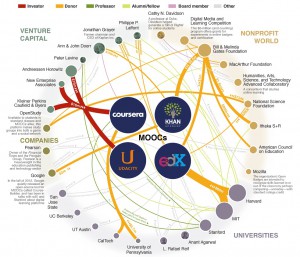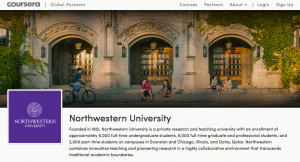
MOOC by giulia.forsythe on Flickr
Recently, I was one of 62,373 people who enrolled in Coursera’s Massive Open Online Course (or MOOC) on Gamification. Unfortunately, I am also among the 56,781 people who did not finish the course. (My more disciplined colleagues Cecile and Matt did indeed stick it out to the end and you can read about Cecile’s experience here.) Now, I am in no way proud of the fact that I dropped out of the course, but as the numbers tell you, I am – quantitatively speaking – in good company. An attrition rate of more than 90% is common for most MOOCs, as this visualization shows. The low completion rate points to one of the great challenges of this type of online education: how do you engage students in a virtual environment in a sustainable manner?
This is obviously not the only question that arises in regard to MOOCs and their role in higher education. In my brief foray here I am not attempting to summarize the debates that have been raging around MOOCs but simply give you a quick overview of two new major online initiatives that Northwestern is pursuing. (One document that has been referred to widely in discussions of MOOCs is this open letter written by faculty members of the San Jose State University Philosophy Department in response to pressure from the administration to integrate a Harvard MOOC into their curriculum. Or see this balanced article in the New Yorker that integrates perspectives of MOOC fans as well as skeptics. See below for a an infographic on major players from the Chronicle of Higher Education. Another helpful overview of the MOOC landscape can be found in this well-designed visualization by Online Schools’ Visual Academy. )

“Major Players in the MOOC Universe,” Chronicle of Higher Education, Digital Campus 2013
http://chronicle.com/article/The-Major-Players-in-the-MOOC/138817/
Starting this fall, several Northwestern professors will have the chance to see for themselves what teaching an online course to thousands of students all over the world feels like. In February, Northwestern announced that it had signed an agreement with Coursera to offer Northwestern courses via Coursera’s online platform. As most of you know, Coursera is a (for-profit) company founded by computer science professors Daphne Koller and Andrew Ng from Stanford University. Coursera’s website currently lists 374 courses that anyone with an internet connection can sign up for, for free. More than 3.6 million users have signed up for courses and when you go to the company’s homepage you can watch this number tick up in real-time. Until a few days ago, Coursera’s main plan for revenue generation was tied to offering a “signature track” for its courses where students have to pay around $50 in exchange for a “verified completion certificate.” On May 29, Coursera announced a new partnership with 10 public universities, through which it “is recasting itself as a platform for credit-bearing courses,” as the Chronicle of Higher Education put it in an article. According to an Inside Higher Education piece, many faculty members at these institutions expressed surprise when they found out about the deal their universities had struck with Coursera. The lack of faculty involvement in negotiations between for-profit companies like Coursera and 2U and universities has been a common complaint and one that has also been voiced by some Northwestern faculty members at recent Senate meetings and at a Faculty Assembly in May.
A good starting point for orienting yourself about Northwestern’s two new major online learning initiatives is this site created by the Provost’s Office which includes a chart contrasting the two efforts:
The table’s contrasting nature is helpful for capturing the main differences between the Semester Online and Coursera initiatives, yet Coursera (and other MOOC providers) are well on their way (or already are) offering for-credit, tuition-bearing courses. (Georgia Tech recently released the details of a new kind of arrangement between the university, the MOOC provider Udacity, and AT&T that will offer a master’s degree in computer science as a low-cost alternative to its on-campus program.)
Northwestern currently lists six courses on its Coursera site and they include three courses offered by McCormick professors, two by Medill faculty and one by the Law School with topics ranging from Systems Engineering to Digital Content Management. At this point, none of the courses have start dates and only three of them have introductory videos in addition to the course description. I encourage you to watch these videos as they give you a good sense of the educational style of MOOCs and the production values involved in creating these courses. Several units on campus have joined forces as the “Coordinated Services Center” that will assist faculty members in the development and production of these courses. (All costs associated with producing these courses rest with Northwestern, which is different from the 2U model where the company is responsible for production costs.)
As of now, no process is in place yet for how Northwestern selects a particular course for the Coursera platform. However, the recently assembled Faculty Distance Learning Workgroup has emphasized the need to establish a transparent process and is advising the Provost’s Office on procedures. This workgroup has been chaired by WCAS Associate Dean Mary Finn and has representatives from all schools including five Weinberg faculty members (of which I am one). You can find the complete membership on this site and you should feel free to reach out to me or any of the members with questions or feedback.
The second online endeavor Northwestern is pursuing is with the for-profit company 2U and a number of other universities who came together as a consortium to offer for-credit, tuition-bearing classes in a program called Semester Online. The website currently lists classes by Boston College, Emory, Northwestern, and the University of North Carolina-Chapel Hill, Notre Dame, and Washington University to be taught in the fall 2013. The consortium originally consisted of 10 schools but several have since pulled out, including Duke University, which left the consortium after a faculty council’s vote against Duke’s participation in Semester Online (see this NY Times article for more information). The only Northwestern course slated for fall 2013 is Medill’s Integrated Marketing Communication. In an email from May 14, Dan Linzer solicited proposals for Winter 2014 (due June 1) and beyond (due August 1). If you somehow missed the email you can find FAQs on Semester onlineon the Provost’s website, including the process for proposal review that the faculty workgroup I mentioned above helped to draw up. (The workgroup has been discussing a similar process for Coursera course selection and is hoping it will be put into place soon.)
Northwestern students can enroll in any of the 11 Semester Online courses offered in the fall and the NU News announcement about these inaugural courses states that enrollment remains open until August 5 and classes start in the week of August 26. They run for a semester but Northwestern students will receive only one credit. Non-Northwestern Semester Online courses will be treated like transfer credit and the approval towards major and minor lies within individual departments. At last week’s Weinberg faculty meeting, several chairs reported that their departments had voted against accepting Semester Online classes towards their majors and minors.
The discussions and meetings on online learning I have been engaged in during this past academic year revealed wide-ranging reactions: from excitement about new ways to reach students and experiments with online platforms and tools to deep concerns about academic freedom, intellectual property, and the potential threat partnerships with for-profit companies pose to higher education. There is an obvious need for continuing these important discussions and the MMLC is planning to host events around this topic in the coming academic year. We welcome your input and ideas. Until then, I might try to sign up for another MOOC, and if I ever make it through one, you might hear about it in an upcoming blog post.
